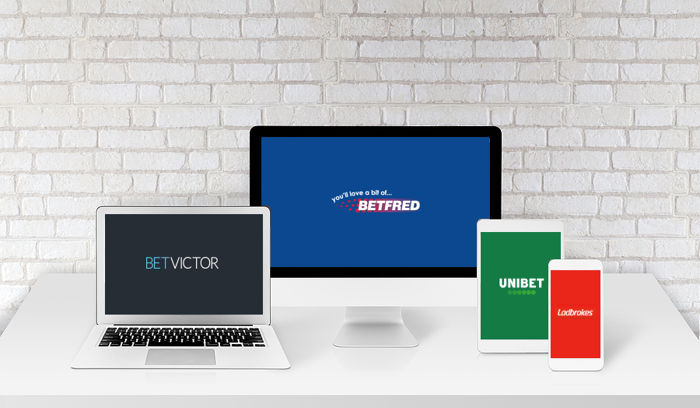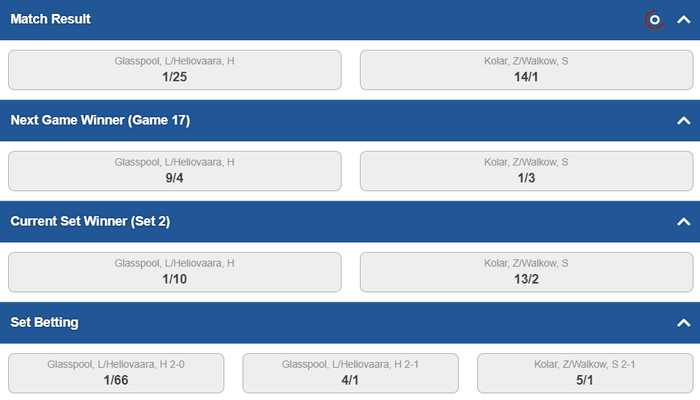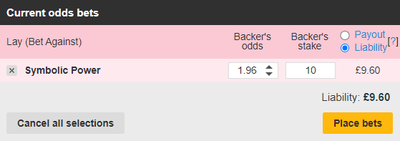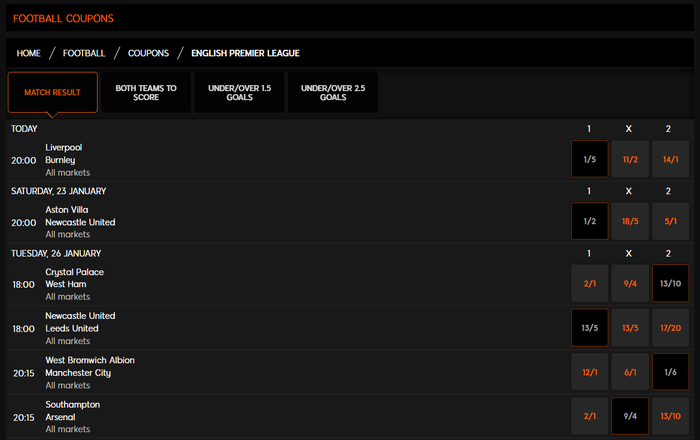 The majority of betting that takes place in the UK, both online and offline, revolves around sport. And whilst there are other things you can bet on – including politics, the weather and even reality TV (which we’ll admit, does make being forced to watch X Factor marginally more interesting) – the number and value of these bets is a mere drop in the ocean when compared to sport betting.
The majority of betting that takes place in the UK, both online and offline, revolves around sport. And whilst there are other things you can bet on – including politics, the weather and even reality TV (which we’ll admit, does make being forced to watch X Factor marginally more interesting) – the number and value of these bets is a mere drop in the ocean when compared to sport betting.
It also shouldn’t come as surprise to hear that the majority of bookies don’t give smaller sports the same attention and detail as the high turnover ‘big boys’ – so a bookmaker that excels at football betting may not have great coverage or odds for tennis. In fact, even the titans of the betting industry can have weak spots.
For this reason we’ve come up with individual guides to various sports, which you can find below. In each guide we’ve written reviews of the top UK bookmakers for that sports, as well as a quick ‘how to’ guide that covers the more common bets and rules that you’re likely to come across. We also provide lists of betting offers and promotions categorised by each sport so that you can squeeze out as much value from your bets as possible.
Bookmaker Reviews By Sport
More will be added very soon. If your sport of choice isn’t listed, please check back in the very near future as our skilled pundits are currently compiling detailed guides for tennis, cricket, darts, Formula 1, golf, rugby, snooker, boxing and American football.
How To Compare Bookmakers

When comparing bookmakers for a particular sport there are a number of things to consider. Whilst not all of these will be on the utmost importance to everybody (for example, if you only bet on Premier League football, you probably don’t care about the coverage of European leagues) they should provide a decent base to work from.
We’ve actually already done the leg work for you in our reviews (see above), but if you want to check how your current betting site matches up to our recommendations, take a look at the following factors:
- Markets – One of the most important things to look at is the range of markets that are available for the sport you’re interested in. Because if you can’t bet on the match, tournament or outcome that you want to, the site will be of little use to you. And don’t forget to check the in-play betting coverage during the match (if you’re into that kind of thing).
- Odds – You shouldn’t assume that if a site offers fantastic football odds that they will also be as competitive in other sports. If the traders aren’t confident in a sport, chances are they’re going to play it safe and work to a larger margin – meaning worse odds for you. So make sure to compare the odds for your favourite sport on the different sites you’re considering to make sure you’re getting the best deal you can.
- Features – Some bookies will go above and beyond to offer additional features for a sport such as stats comparison, live streaming and third party data integration. And even seemingly minor usability features such as quick slips and easy-bet coupons can make a difference.
- Offers – A good sign that a bookie pays a lot of attention to a sport is including it in their offers. For example, if you’re a tennis fan you may wish to find a site that offers free bets or money back specials on the big tournaments. With the smaller sports the promotions tend to only crop up around the bigger events, so do your comparing at the right time.
These are, of course, in addition to the regular things that you’d look for in a good betting site such as reputation, customer support, general usability and banking. If you’re looking for general recommendation of betting sites without any specific sports bias, head over to our top 10 list.
Sports Betting Strategy

We have a wealth of information around our site to help you enjoy betting on sports. We’ve got betting trends for football and racing, free bets, a handy betting FAQ section and loads of other resources to assist both betting newbies and seasoned old hands. That includes sports-specific betting strategy guides, as well as information on the various major football competitions, plus tips for when you want to bet on them.
Here though we are looking at the bigger picture and providing very general info that is applicable to all sports betting and even, to a lesser degree, all forms of gambling. We aren’t offering, indeed can’t offer, tips that will guarantee your betting is a success, nor specific winning betting tips that will make you your fortune.
We can, however, provide you with the broad foundations and knowledge that every successful bettor has when it comes to essentials such as staking plans, managing your bankroll, understanding markets and value, and – crucially – the common mistakes you should avoid like the plague.
Using Multiple Betting Sites

We’ll start at the beginning and one of the most important things when making a bet is deciding where you place the wager. There are so many bookies to choose from nowadays and whilst it can be tempting to stick with what you know, it makes sense to join multiple bookies.
The advantages to using multiple betting accounts are:
- Access to better odds
- More free bets and welcome offers
- Better choice of ongoing promotions & markets
Access to Better Odds
If you have just one online betting account then you will be forced to accept whatever odds that bookies offers. However, if you have 20, you can choose the bookie with the highest odds, and those could be 20% or even 30% higher than the lowest available. Betting at the best available odds is the simplest way to improve your return and even if you regularly pick duds your losses will be smaller because at the very least your occasional winners will return as much as possible.
Free Bets & Offers
You also increase your chances of success because almost every betting site around offers new customers some form of incentive to join. With some giving away as much as £100 in bet credits and others offering £20 of free bets – or sometimes even more – for just a £5 bet, these promotions are effectively loss leaders for the bookies and a rare time where the odds are in the punter’s favour.
Better Choice
As well as taking advantage of an initial free bet, having multiple accounts also gives you a wider range of existing-customer promotions to choose from. Different bookmakers run different deals and the more choice you have, the better.
Let’s say you and a friend both fancy Sky Lantern in the big race and all the best betting sites have priced the filly at 10/1. However, one of the sites may have a money back offer on the race, or enhanced each way place terms. By using that site, you may get a payout or a cash/free bet refund when your friend, who places the bet on the same horse using another site, won’t.
As with the differences in odds, this may make only a small difference on a single race, but over time this can have a real impact on your overall success. Such an offer might only payout (for you) once or twice a season but why would you turn down any money, ever? Best of all, this takes no extra skill or effort, so why miss out?
As said, despite all these pros, in many ways it is human nature to stick with what one knows. You have an account with a bookie and you like it, so why join another site? Well, aside from all the reasons already mentioned, who’s to say you won’t like a new bookie more? Free bets and other offers give you a incentive to try a new site, so give it a go and you might find the grass is even greener elsewhere.
Value Bets
![]() Many betting newbies and even lots of regular punters believe the key to betting is finding winners. Now, obviously that’s true but the winner is only known afterwards. At the time you place the bet, all you can go on is value and so it is this that you should be looking for.
Many betting newbies and even lots of regular punters believe the key to betting is finding winners. Now, obviously that’s true but the winner is only known afterwards. At the time you place the bet, all you can go on is value and so it is this that you should be looking for.
We won’t get into value betting in too much detail here as it is covered in various other sections of this site. However, in short, to calculate a value bet, you have to first try and decide what probability you think there is of an event occurring.
If we imagine a basketball game where there are only two possible results (on the moneyline market) and you think it will be a close game. You might study the form, injuries, motivation, head to head and everything else that could affect the game and decide the Team A has a 56% chance of winning, whilst Team B has a 44% chance.
Now you must look at the odds and compare them to this. To do that you need to work out the implied probability of the odds.
Implied Probabality = (1 ÷ decimal odds) multiplied by 100
If you are familiar with decimal odds you simply divide 1 by those. For fractional odds, you will have to convert to decimals first. If a side is 10/11 you simply divide 10 by 11 and then add on 1, to give a decimal price of 1.909
So, taking a side priced at 1.909, to calculate the implied probability you divide 1 by that. That would give you an implied probability of 52.38%. Now, going back to our example of Team A and Team B, let us imagine that the best odds on both sides are 10/11. This factors in a margin for the bookie, without which the odds on both would be even money, or 2.0, reflecting the fact that the bookmaker believes both have an equal chance of winning the game.
| Team A | Team B | |
|---|---|---|
| Estimated Probability | 56% | 44% |
| Estimated Odds | 1.786 | 2.273 |
| Odds Offered | 1.909 | 1.909 |
| Implied Probability | 52% | 52% |
| Verdict | Good Value | Poor Value |
In this instance, Team B is poor value. The odds imply that team should win around 52% of the time and are, therefore expected to win more often than not. However, you think they have only a 44% chance of winning, meaning they will lose more than they win.
In contrast, Team A is a value bet at odds of 10/11 because those odds are longer than you would expect for a team you think will win 55% of the time.
But…
Those that argue against value say that you can’t pay the bills with it and that only winners matter. But anyone with even the simplest understanding of value and betting does apply it. Unless the bookies have made an unfathomably big error, a horse, football team, tennis player or other bet priced at odds of 1/7 should win. It is by far the most likely to win, with, let’s say, the second favourite out at 6/1.
If all you care about is backing winners, then there is surely no decision to make. The 1/7 shot has around an 88% chance of winning and the 6/1 shot about a 14% chance (the percentages are greater than 100 due to the bookies’ overround or margin).
However, if you think the 6/1 shot will go well, consciously or subconsciously you might think it could win one in five times. That equates to a 20% chance of success and makes it a value bet at 6/1. Even though it still has around a quarter of the chance of winning that you think the favourite has, you back the underdog because it offers value.
Finding Value Bets

Unfortunately, understanding the maths is the easy part. Actually finding value bets and accurately calculating the probabilities is much harder. For most people it is, in fact, impossible to beat the bookies. Not only do you have to beat them at their own game, you also have to beat the margin they factor in.
The bookies have dedicated experts who set the odds based on years of experience, access to masses of information and algorithms they are constantly refining. We talk elsewhere about how to try and find value and what to look out for but in short you need to consider as much information as possible.
Bookmakers do, of course, sometimes make mistakes and for those with the skill, time and determination to look for and identify them, value can be found. Doing it consistently enough and well enough is the even harder part of course!
What Type of Punter Are You?
 Having said that beating the bookies is incredibly tricky and beyond the scope of most punters in the long term, it is important to realise what type of bettor you are. The vast majority of people who place sports bets will do so for fun and this is surely the right way to approach it.
Having said that beating the bookies is incredibly tricky and beyond the scope of most punters in the long term, it is important to realise what type of bettor you are. The vast majority of people who place sports bets will do so for fun and this is surely the right way to approach it.
Very few people who bet will show a net-win from their activities over a lifetime. In the long-term, the bookmaker will win. So much is in their favour, chiefly the fact that they include in the odds a margin so the odds are literally in their favour. However, plenty of punters will, at some point, defy the odds and experience a good run of results.
Perhaps the biggest tip and strategy guide we can possibly give anyone is to accept that you they are a recreational bettor and only ever bet for fun. Bet what you can afford to lose, enjoy your wins and accept your losses. We realise this sounds a bit like telling someone to get healthy they need to eat a bit less, move a bit more and eat more fruit and veg but sadly that’s the way of the world.
Much as we want miracle cures and instant solutions, in most areas of life we know the truth, we just might not like it all that much! That said, whilst settling for the occasional winner but an overall loss is probably wise for many, it isn’t the only way to go about things.
A tiny proportion of people who bet will be able to make it work. However, for many the time, effort, control and dedication needed will make it impossible, or simply not worth the energy. As such, boring as it may be, our top piece of sports betting strategy is to consider that you are buying excitement with your bets, with any cash returned an extra bonus on top.
Pitfalls to Avoid

Before we go on to look at some specific areas of betting and some worthwhile strategies, we will now look at common mistakes gamblers make. Betting has been around almost as long as humanity itself and for most of that period people have been making the same mistakes. Following on from the above, the most common mistake and indeed the biggest one, is to chase your losses and we will consider that first.
- Chasing losses
- Betting more than you can afford
- Betting when drunk
- Betting on your own team
- Believing you have a fool proof system
- Being overconfident
Do Not Chase Losses
When you lose, a combination of anger, self-pity and even shame can hit some people. Betting should be fun and, as in sport, losing is all part of trying to win. Without one there cannot be the other. Is that a bit Zen and Yoda for a piece on gambling strategy? Perhaps, but it remains true.
When you lose, as will inevitably happen at some stage if you places bets regularly over a period of time, you may feel the desire or even compulsion to try and win back what you lost. This can especially be the case if you feel you were unlucky, you placed a large bet or you were especially confident about the bet.
A word of caution: do not let your emotions get the better of you and if you do lose, even when placing bets that you were very confident of, simply accept it and move on. Chasing your losses is the surest way to misery and losing more than you want to, so don’t do it and always gamble responsibly and sensibly within your means.
Only Bet What You Can Afford to Lose
Related to the above is betting more money than you can afford. We will consider staking plans and bankroll below but no matter how you bet, you should never bet with money you need for more important things. Betting should be viewed as a leisure activity. In the same way you might set aside £50 (or whatever suits your budget) for a night out, set aside a sum that you intend to bet… and stick to it.
Don’t Bet When Drunk
Another common mistake to make but one that is very easy to avoid is betting when you are drunk. We would also include within this betting under the influence of drugs (legal or otherwise), betting when very tired and betting when under extreme stress or in a difficult period of life.
Obviously, at such times you will not be thinking clearly and your judgement may be seriously impaired. Now, if you are betting just for fun, this may not matter so much and many people enjoy a drink at the races or other sporting events on which they are betting.
This is fine but it’s important to retain control in such situations and realise that when drunk, your ability to avoid other mistakes, such as loss-chasing, may be significantly reduced.
Don’t Bet on Your Own Team
Betting on your own team can be another thing to avoid. If you are taking sports wagering seriously we would definitely advise giving this a miss as, whilst your knowledge may be increased, it is hard, if not impossible, to separate emotions from such bets. Your heart can all too easily rule your head.
If you are betting for fun this is much less of an issue but even punters who gamble solely recreationally are aiming to win, so recognising that you may not be seeing things in an unbiased way is still prudent.
Don’t Believe in Systems
Last but most definitely not least is to avoid the common trap of thinking you have got the whole thing licked. This is actually one of the most common mistakes people make and can often prove one of the costliest. Quite simply, there is no fool proof way to win at betting and no system other than finding value bets that can overcome the advantage the bookmakers have.
Mistakes in this category come in many shapes and sizes but “discovering”, “inventing” or even buying a system that you think cannot lose is the most common one. Often these are some form or variant of the Martingale system, whereby stakes are doubled after a losing bet. The theory is that you cannot lose because, eventually, when you do land a winner, all losses will be recouped.
The problem with such a system is that before long you will suffer a catastrophic sequence of losses that mean you can no longer afford to double your stake or you will reach the betting limits of a given bookmaker. People think this won’t, or even couldn’t happen; but not only is it possible, if you bet regularly enough it is inevitable. More on betting systems can be found here.
Don’t Be Overconfident
The other common type of mistake within this area is simply to believe you are a better punter than you are. There is an element of luck needed when it comes to betting and fortune will favour even the worst punter for a period of time. In such a situation it’s easy to fool yourself that it is not luck but gambling insight and skill that is guiding you to success.
The flip side of this is just as bad, with many punters believing that they are desperately unlucky and their bets are losing not because they are poorly thought out wagers, but because of that tempestuous mistress called Lady Luck.
Bankroll and Staking Plans

Whilst no simple technique can turn a bad bet into a good one, anyone betting on a regular basis should have at least some vague idea about staking plans. Deciding how much to bet on each wager and managing your bankroll tie in with avoiding staking more than you can afford, however, they offer much more than that.
How you apply these ideas will depend very much on what your aims are and how seriously you wish to take your betting. If your aim is to make your available funds last a certain period, for example the duration of a football season, your staking plan will differ from someone who wants to “bet big or go home”.
Types of Staking Plan
Broadly speaking there are four different types of staking plan, a staking plan being a scheme that helps you decide how much to bet on a given selection.
- Negative progression – stake increases after a losing bet
- Positive progression – stake increases after a winning bet
- Flat – stake is always the same
- Kelly Criterion – stake alters according to odds and/or perceived value
Negative Progression
This is the worst type of staking plan in our eyes and we would recommend avoiding this. The aforementioned Martingale is the most famous negative progression. By increasing your stake after a loss you are able to recover losses and quickly turn a negative position into a positive one. However, this is chasing losses by any other name and means you are betting more when you can least afford it and when confidence is low.
Positive Progression
Positive progression has some merit because when you are winning confidence is high and your form, such that it exists within gambling, is good. More importantly, you can afford more as your bank roll is bigger. That said, such a system pays no heed to the merits of the bet and can mean that any previous wins are quickly lost.
Flat
A flat staking system is one where you bet the same amount on every bet, regardless of your bank roll, previous bets or your confidence in the selection. For many recreational punters this may be the best option as it gives you control over the minimum number of bets you will be able to place and also avoids any over-confidence or loss-chasing.
Kelly-Criterion
 As applied to gambling the Kelly Criterion is a formula devised to determine how big a bet should be. In short, the stake varies according to your bankroll, the value within the bet and the chances of winning and losing. To simplify that yet further, obviously if you have a bigger bankroll you can afford to bet more, likewise, the more value the bet holds, the higher the stake.
As applied to gambling the Kelly Criterion is a formula devised to determine how big a bet should be. In short, the stake varies according to your bankroll, the value within the bet and the chances of winning and losing. To simplify that yet further, obviously if you have a bigger bankroll you can afford to bet more, likewise, the more value the bet holds, the higher the stake.
When it comes to the chance of a bet winning or losing, it obviously makes sense to bet smaller amounts on a bet that has a low chance of winning. So, you may like the look of Dirty Diana in the big race and believe that at 20/1 she offers huge value.
This may almost be the bet of the century, because you have calculated she should be more like a 4/1 shot, with around a 20% chance of winning as opposed to the 5% chance the odds imply. Getting a 4/1 bet at 20/1 is the sort of bet you are unlikely ever to find but Kelly would moderate the stake as, even though it is amazing value, it still has an 80% chance of losing.
In contrast, in another race you might like the favourite at even money, calculating that it actually has a 58% of winning the contest. Interestingly the Kelly Criterion would recommend the same stake value (16% of your bank) in both instances. Whilst the value seems much greater in the first bet (a 20/1 bet with a 4/1 chance versus an evens horse with a 7/10 chance), this is offset because the shorter-odds horse is far, far more likely to win.
The Kelly Criterion has been criticised because it is very aggressive and can lead to some very big stakes that, with bad luck, can quickly eat into your bankroll. Over the years people have come up with modified variations of it and there are many of these. These all take into account, essentially the key factors mentioned: bankroll, value and chance of success.
How Much Should You Wager on a Bet?
 The only strategy we would firmly advise against is increasing your bets after a loss. As said, this is essentially chasing your losses and is unwise at best. As said, how much you bet will depend on your aims and a staking plan is only really important if you are taking gambling very seriously. In truth we suspect that many punters probably perform some form of Kelly-style calculation for a lot of their bets, consciously or otherwise.
The only strategy we would firmly advise against is increasing your bets after a loss. As said, this is essentially chasing your losses and is unwise at best. As said, how much you bet will depend on your aims and a staking plan is only really important if you are taking gambling very seriously. In truth we suspect that many punters probably perform some form of Kelly-style calculation for a lot of their bets, consciously or otherwise.
For example, if you are backing a 300/1 acca, your stake is likely to be smaller than if you are backing an even money favourite. Similarly, if you really, really fancy a horse at 4/1, your stake will probably be bigger than if you don’t like the favourite so are backing the second favourite at 4/1 more on a hunch.
Many punters don’t keep a bankroll, in terms of having a fixed amount set aside for gambling, and instead place bets on more of an ad hoc basis. However, they may have some notion of whether they are up or down in general or within a recent period.
Bankroll or not, increasing your bets when you are winning isn’t such a bad idea, as in essence this is keeping them flat in proportion to your finances. Many betting experts advocate a proportional system, with stakes growing and shrinking according to your available cash and it’s hard to argue with this logic.
To Cash Out or Not to Cash Out, THAT is the Question

Cash out offers punters more control and can be great when you call it right but many punters find the extra choice infuriating. For many it poses more questions and quandaries than it provides answers and deciding whether to cash out or not is always a tough call.
There is no overriding strategy when it comes to cash out and really it should be viewed as simply another bet that is considered on a case by case basis. Ultimately whenever you cash out you do concede a small chunk of value to the bookie, as you do when you make a bet, so it is something you shouldn’t rush into.
In general we have a few rules we usually stick to but really when it comes to cash out you have to make that call yourself.
We tend to cash out if…
- The initial bet was one placed with little confidence, for example at high odds
- The difference between the cash out value and full win is very small
- In-play we have lost all confidence in the bet
We tend not to cash out if…
- The initial bet was one we really believed in and is playing out as expected
- There is a small, early win available
- We are watching and remain very confident
Backing Very Short Odds Favourites

Some punters never back odds-on favourites, whilst others tend only to back such selections. In our opinion both of these strategies are wrong and we are perfectly happy to back a selection at any odds if it offers value. Some of the best value bets we’ve made have been on Betfair’s Exchange at 1.01 (the shortest odds they offer).
That’s because if you can get odds of 1.01 (1/100) when the real odds should be 1/1000, you have found a bet offering huge value. Some punters say things like, “there’s no value at 1/5” but if a tennis player is 1/5 and they have a 90% chance of winning then that is indeed great value. It’s easy to confuse returns with value and whilst many every-day bettors will feel betting £50 to win £10 is “bad value”, if you have a 90% chance of winning that £10 then in actual fact it’s great value.
Laying Favourites
 The advent of betting exchanges opened up many new possibilities and betting systems to punters and laying selections was one of the biggest. Since exchanges first launched around the turn of the millennium, one of the most common “systems” people have tried is laying favourites, believing this was some miracle way to get rich.
The advent of betting exchanges opened up many new possibilities and betting systems to punters and laying selections was one of the biggest. Since exchanges first launched around the turn of the millennium, one of the most common “systems” people have tried is laying favourites, believing this was some miracle way to get rich.
Again, value is at the crux of the issue and whether laying a selection will win in the long term depends on your ability to lay it at the right price. People assume that because the bookies win laying selections that it must work but that ignores the fact that betting sites usually offer lower odds than Betfair and also don’t have to pay Betfair’s commission (though of course they have many other costs).
Laying a horse, football team, golfer, correct score, the winner of X Factor or who the next President will be doesn’t turn you into the bookie. Equally laying the favourite in every race will not miraculously have the wins rolling in. Laying any bet is, in effect, backing all the other options, in that you win if any other pick is victorious.
Obviously, if you back all bar one option in any event you will usually win. But you will often only win a relatively small amount. Moreover, unless you are consistently laying at odds shorter than they “should” be, those rare times you do lose will more than wipe out the many small wins that had gone before.
Accas or Singles?

Just as some people love odds-on bets and others hate them, so too are punters often divided between those who only bet on accas and those who never bet on them. At the danger of sounding like a record (everyone listens to them still, right?) stuck on the same slightly whiny horn section of a fairly boring jazz track, on the one hand, this issue boils down to value and on the other it’s all about why you are betting in the first place.
Accas for Show, Singles for Dough
If your primary aim in betting is to have more frequent wins then you are probably better off sticking to singles, doubles and, perhaps, at the very most trebles. As we might have mentioned, on most bets the odds are in favour of the bookmaker. If you have one bad value bet the bookie has an advantage of around 10%. The more selections you add onto this, assuming all are poor value, the greater the bookie’s advantage.
Of course, if you are hugely confident that you have more than one value bet lined up then combining them will work the other way and multiply your expected advantage over the odds makers. As said though, finding genuine value and beating the bookmakers is fiendishly difficult and so being so sure that multiple selections offer value is very rare. This, in essence, is why pros and those that take their betting very seriously tend to stick to singles.
Now, as we have said, betting for most people is a fun diversion, a leisure and entertainment pursuit, not a business. In this instance accas are well worth considering. For a very small stake you can not only have an interest and extra excitement in a number of events, but you also have the chance of a huge payout.
If you view an accumulator as akin to buying a lottery ticket then they really are a great option for many punters. Stakes of £1 or less can easily deliver three-, four- and even five-figure returns. Moreover, whilst the lottery is pure chance, with an acca you get to have at least some say in your fate.
Given the UK National Lottery has become less and less attractive due to the increased cost and longer odds about landing the jackpot, more and more punters are placing accas and it’s easy to see why.






